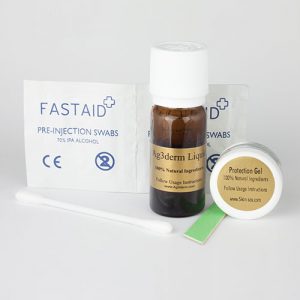Enzyme therapy, also known as systemic enzyme therapy, is used to treat a variety of conditions including pigmentation. Enzyme therapy involves the administration of enzymes into the body. Enzymes are macromolecules that do a range of things. They speed up biological processes in the body, work to digest food, break down toxins, reduce stress to the pancreas, build protein muscle and cleanse the blood as well as strengthen the immune system. Enzyme therapy encourages enzymes to flow through the body, producing beneficial, healing changes.
Enzyme therapies for the skin are non-invasive treatments that remove the dead protein cells from the surface of the skin. When used to treat skin pigmentation problems, enzyme therapy is used to stimulate new collagen production and restore the structural integrity and cellular organization of the skin. Enzyme therapy can be used by people with most skin types. The treatment does work best for people with fair skin, but specific programs can also be constructed for people with Asian, Indian and darker skin tones. For people suffering from pigmentation problems that affect their face, enzyme therapy can be used as an effective facial treatment. For those wishing to treat pigmentation problems through the use of enzyme therapy, this treatment can help to inhibit melanin production as well as remove dark spots, pigmentation, freckles and sun damage. While enzyme treatments claim to result in improvement in your condition as well as restoring your skin to a level of general health, they are not 100% guaranteed. A definite timeframe cannot be given for expected results and results can vary from person to person depending on each individual’s skin. Some people experience results after a single treatment while others require several treatments over a period of time in order to achieve the desired results.
After enzyme treatment you may experience side effects such as tightness and dryness of the skin, redness or irritation, stinging or burning. Some people also experience an outbreak of acne, and this can be a result of the enzyme therapy unlocking the impurities in the skin. You may also experience darkening of the skin as skin cells with pigmentation move to the surface. This can indicate that the enzyme therapy is working as it should to reduce your pigmentation problem. Exfoliation on your face should resolve this issue and result in more even pigmentation. There is a small possibility of a negative reaction, although this is to be expected with any treatment to your face. Ensure that you avoid sun exposure after having enzyme treatment. The treatment causes UV sensitivity so ensure that you wear a quality UVA/UVB sunblock with an SPF of 30 or more following your treatment.
Recent Skin Pigmentation Articles:
Are Pigmentation Problems Dangerous?
Pigmentation : Ethnic Skin Treatment

